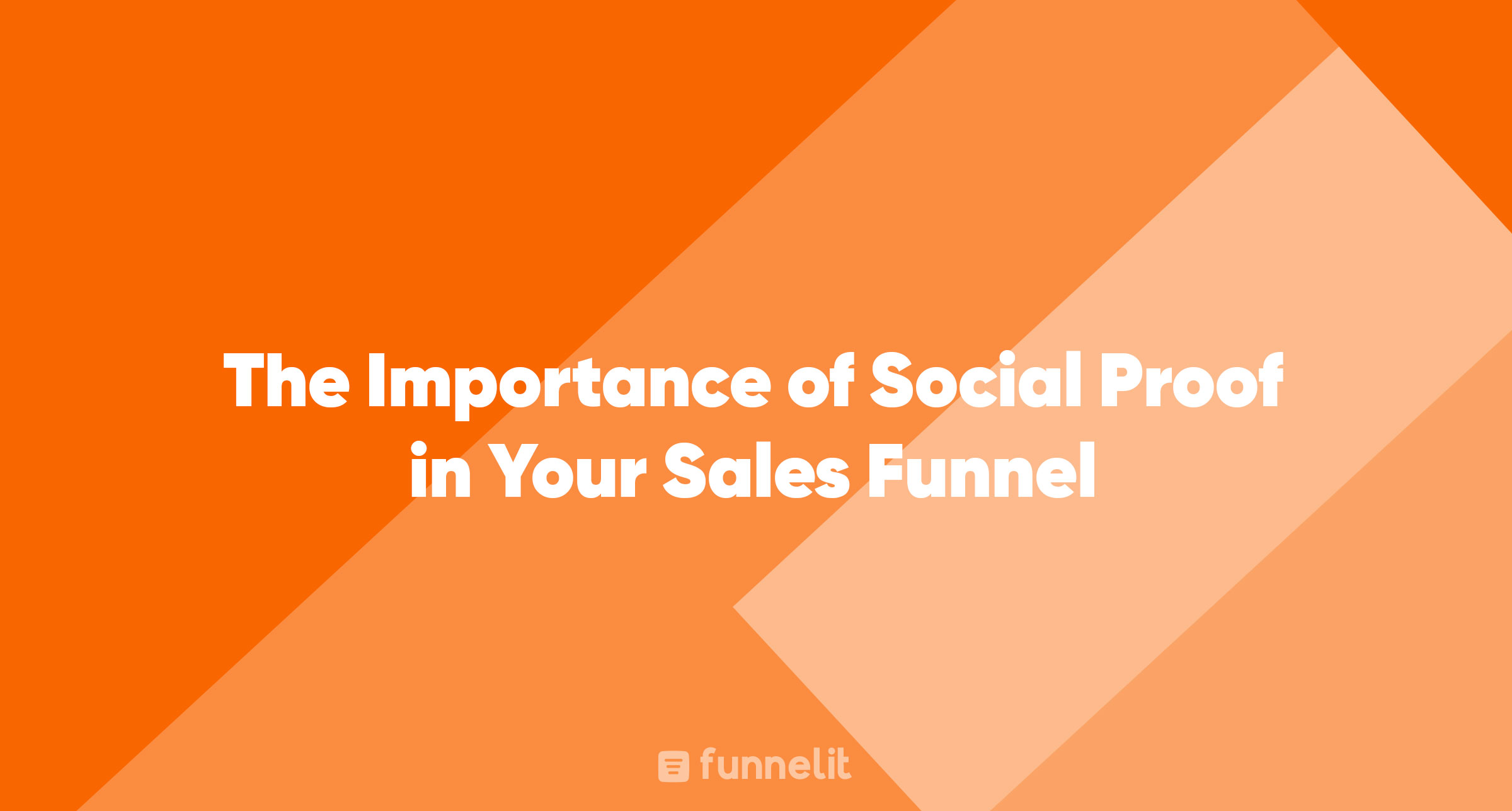Are you leveraging the power of social proof in your sales funnels? If not, you might be leaving a significant amount of revenue on the table. In the competitive world of online marketing, harnessing social proof can be the difference between a potential lead becoming a customer or bouncing off your page. But, what is social proof, and how can it impact your sales funnel? This article delves into the importance of social proof in your sales funnel and offers practical ways to integrate it into your digital marketing strategy.
What is Social Proof?
According to Robert Cialdini, the author of the seminal book Influence: The Psychology of Persuasion, social proof is a psychological and social phenomenon where individuals copy the actions of others in an attempt to exhibit correct behavior in a given situation. In layman's terms, we humans are wired to mimic the behavior of others, especially in unfamiliar situations or when we are unsure of the right course of action.
The Significance of Social Proof in Your Sales Funnel
Social proof can be a game-changer for your sales funnel. It helps to build trust with your potential customers, validates their buying decisions and can significantly boost your conversion rates. In fact, statistics indicate that a staggering 87% of purchasing decisions start with online research, and 92% of consumers read online reviews before making a purchase decision. Essentially, social proof acts as a form of "word-of-mouth" marketing, enabling companies to leverage external validation and customer advocacy to influence potential customers.
Types of Social Proof to Enhance Your Sales Funnel
There are several types of social proof, each with its unique potential to boost your sales funnel. Depending on your specific industry and goals, you may find one type more effective than others. Here are six types of social proof that can dramatically enhance your sales funnel performance:
1. Customer Testimonials
Customer testimonials can be a powerful form of social proof. These are direct endorsements from satisfied customers, expressing their positive experiences with your product or service. When potential customers see these testimonials, they are reassured that your offering has been tried, tested, and appreciated by others.
2. Reviews and Ratings
Reviews and ratings are similar to testimonials but are often more objective and detailed. They provide potential customers with an unbiased assessment of your product or service. High ratings and positive reviews can significantly enhance the perceived value and credibility of your offerings.
3. Case Studies
Case studies provide an in-depth, data-driven analysis of how your product or service has helped a particular customer. They offer concrete evidence of your product's effectiveness and its potential to solve real-world problems.
4. Social Media Mentions
Social media mentions can serve as potent social proof. When customers share positive experiences with your product or service on their social media platforms, it amplifies your brand's reach and credibility.
5. Influencer Endorsements
Influencer endorsements are an effective form of social proof, particularly in today's digital age. A recommendation from a respected industry expert or popular influencer can significantly boost your product's credibility and reach.
6. Trust Icons
Trust icons include awards, certifications, and badges that your business has earned. They signify recognition from reputable third-party entities and enhance your brand's credibility and trustworthiness.
Innovative Ways to Leverage Social Proof in Your Sales Funnel
While the above-mentioned types of social proof are all effective, there are innovative ways to leverage social proof in your sales funnel. Here are three unique spins on social proof that could give your sales funnel an added advantage:
1. Storytelling Social Proof
Storytelling social proof involves weaving customer testimonials into a compelling narrative. This form of social proof can be more engaging and persuasive than traditional testimonials, as it allows potential customers to visualize the benefits of your product or service.
2. Implied Social Proof
Implied social proof subtly conveys social proof without explicitly stating it. For example, showing high levels of activity on your website or a large number of users can imply that your product or service is popular and well-liked.
3. Activity-Based Social Proof
Activity-based social proof involves showing real-time activities of customers on your website. This could be in the form of pop-up notifications showing recent purchases or sign-ups. This creates a sense of urgency and can spur potential customers to take action.
Implementing Social Proof in Your Sales Funnel
To make the most of social proof in your sales funnel, consider these best practices:
- Choose Relevant Social Proof: The type of social proof you use should be relevant to your industry and target audience. For instance, if you're a B2B software company, case studies may be more effective than customer reviews.
- Use Authentic Social Proof: Always use real testimonials, reviews, and case studies. Authenticity is crucial for building trust with your potential customers.
- Place Social Proof Strategically: The placement of your social proof can significantly impact its effectiveness. Consider placing it near your call-to-action (CTA), product descriptions, or pricing information to reinforce your value proposition and counter any potential objections.
- Regularly Update Your Social Proof: Keep your social proof up-to-date to show that your product or service continues to satisfy customers. Outdated testimonials or reviews may make potential customers question the current quality of your offering.
Conclusion
In conclusion, social proof is a powerful asset in your sales funnel. By leveraging different types of social proof such as testimonials, reviews, case studies, and influencer endorsements, you can build trust with your potential customers, validate their buying decisions, and ultimately boost your conversion rates. Remember, the key to effective social proof is relevance, authenticity, strategic placement, and regular updates. With these best practices in place, you can maximize the potential of social proof and significantly enhance the performance of your sales funnel.
